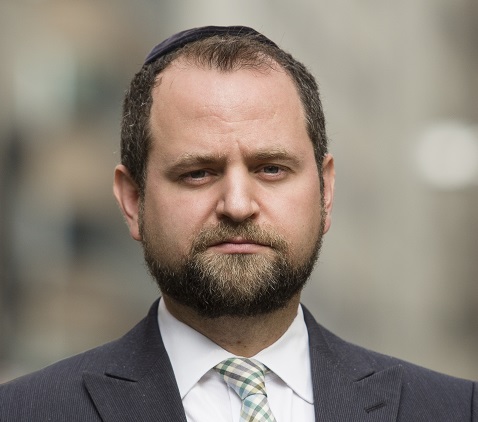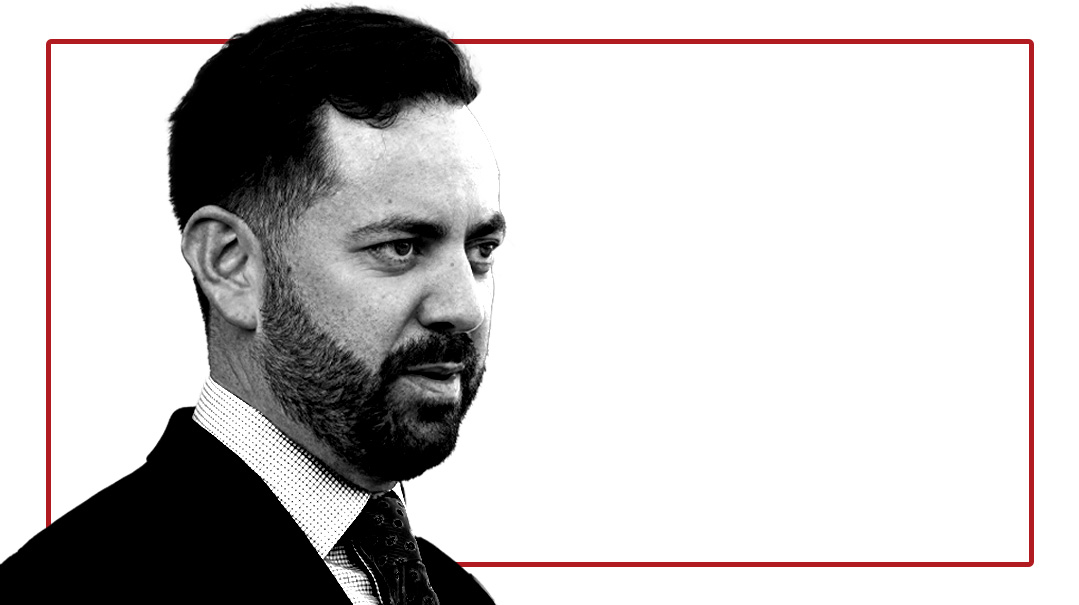A Few Minutes with Rep. Mike Lawler (R-NY)


“Politics ain’t beanbags — it’s rough and tumble”

Photo: AP Images
It’s not exactly a “Jewish district,” but some 90,000 residents of New York’s 17th Congressional District — about 12 percent — are members of the Tribe. The newly redrawn 17th District abuts the New Jersey border and includes the predominantly Orthodox communities of Monsey, Kiryas Joel, and New Square.
In the November midterms, Republican challenger Mike Lawler unseated incumbent Congressman Sean Maloney by 3,250 votes, despite the district’s solid Democratic majority. Prior to that, Lawler, 36, had served two years in the New York State Assembly, where he successfully sponsored bills to provide additional funding for law enforcement and education, and tax relief for middle-income families, while also building relationships with leaders and rank-and-file members of Rockland County’s Orthodox Jewish community.
An outspoken supporter of Israel, and champion of school choice, Lawler is a member of the House Committees on Foreign Affairs and Financial Services. This interview, which appears in full on Mishpacha’s Power Politics podcast, has been lightly edited for brevity and clarity.
Your election was a close one. I won’t use the word “upset” to describe your victory, because when candidates win, they don’t consider it an upset. They had a plan to win. What do you think drove voter turnout in your favor?
Number one, a big part of it was redistricting. We got a fair set of maps in New York that made these districts competitive.
Number two, this was the first time in our nation’s history that Democrats controlled everything in Washington, Albany, and New York City at the same time, and they created a mess. The 40-year record high on inflation, surging crime, skyrocketing energy prices, a southern border with a massive inflow of illegal immigrants who brought drugs pouring into our communities, killing Americans, and then international crises that we were dealing with, from the Russian invasion into Ukraine, and China. Voters across the district wanted to restore balance and common sense at every level of government and ensure that their voices were heard.
Finally, and this may be most important, I’m a lifelong resident of the district. I was traveling around the district doing six, seven, or eight events a day while Sean Maloney [his incumbent opponent] was gallivanting across the globe in his role as DCCC [Democratic Congressional Campaign Committee] chair. People saw that and appreciated how hard we worked, and in the end, we won.
Even without the burning issues you mentioned that were bothering people, you have a good track record at drawing cross-over votes in a predominantly Democratic district, even though you’re a Republican. That’s going to be very important going forward nationally. What can you share from your experience that can help other Republicans nationwide who need Democratic votes to win?
My congressional district has 70,000 more Democrats than Republicans. The way that I have approached campaigning, and governing, is to focus on the issues that cut across party lines. People are focused on a few basic issues. People want good-paying jobs to provide for their families, quality education for their children, and access to housing and health care, and they want to live in safe neighborhoods. That was the message we carried forward in every community we went to. And I didn’t shy away from areas where Republicans haven’t fared as well in past elections. Nineteen percent of the district is Latino. It has large Jewish, Irish, and Haitian communities.
One of the things I have always done as a member of the Assembly, and now as a member of Congress, is make sure that my staff is reflective of the communities in which we are serving. I have a Haitian Creole-speaking staffer. I have an Orthodox Yiddish-speaking staffer. I have a Latino staffer. And we’re continuing to be responsive to the needs of the communities we serve. That’s critical for any Republican seeking elected office.
As a member of the House Foreign Affairs Committee, I’m sure you’re aware that the Biden administration has been putting some pressure on Israel to supply Ukraine with arms. Do you think this is an appropriate request, considering Israel’s security situation and the fact that it needs to tread very carefully with Russia so the IDF can continue to operate in areas in Syria that are Russian-controlled?
There are always challenges anytime you’re dealing with international issues. The situation in Ukraine is serious and requires the United States and our allies to work together. If Vladimir Putin is successful in his endeavors there, it’s not going to end with Ukraine. Other former Soviet satellite countries will be in jeopardy, including Moldova, for instance, where my wife is from.
The United States is supplying a lot of weaponry. Our allies in Europe are supplying a lot of aid. Israel has its own challenges that it needs to be cognizant of, and we certainly are in the United States. Israel is our greatest ally, and we need to continue to work together to ensure their safety and security in the region. But I think all of us collectively have an obligation here to make sure that Vladimir Putin is not successful in seizing full control of Ukraine.
You gave a very fiery speech about a month ago on education, school choice, and the needs of parents. Can you talk to us about that, both as a parent and as someone who understands this issue in the community?
I’ve strongly believed for a very long time that parents, not bureaucrats, have the right to have a say in their children’s education. And that starts with school choice.
I’m a product of public schools. We have great public schools here in New York, and certainly across the 17th Congressional District, but they’re not without their own challenges. And a lot of private schools, parochial schools, and yeshivos provide quality education to children throughout the district and the state. I’ve always believed parents have the right to send their children to a school of their choosing. I do believe in religious education. As a practicing Catholic, I went to a Catholic college, Manhattan College.
It’s important to have that religious foundation. A lot of the criticism of yeshivos has been unfounded. I’ve said it before and will say it again: If there is a school where they’re not adhering to the law, then you deal with that, whether it’s a public or private school. But to make a broad-brush statement, as the New York Times did, is very unfortunate. Substantial equivalency does not mean [offering] the same curriculum. Substantial equivalency is talking about outcomes.
I would submit that most people who have a yeshivah education do very well, and are very productive and contributing members of our society and of the community at large. We need to focus on how we ensure that every child, regardless of what school they attend, whether it’s a public school, a private school, a charter school, or a vocational school, gets the education needed to put them on a career to success and to be contributing members of our society. And obviously, we should not have a one-size-fits-all approach. It doesn’t work if that’s the objective.
As a freshman congressman, what have you seen so far in Washington that was unexpected or that you didn’t anticipate?
Having been around politics a very long time — I got started working for John McCain as an intern when I was in college. I was the executive director of the state Republican Party in New York. I’ve served in local government, both as an advisor and as an appointed official, and then in the state legislature. I’ve been relatively well prepared, so not too much shocks me or surprises me in government and politics. But in our first week, we dealt with the historic Speaker’s vote that took 15 ballots. I don’t think anybody was anticipating it taking that many ballots. That was certainly a little bit surprising.
But when you take a step back, that’s democracy. People are elected, you have an exchange of ideas, and ultimately something is going to move forward. And I felt it was important to support Kevin McCarthy. I think he’s the right person for the job, and I think he’s doing a great job as Speaker. I’m glad we were able to build the consensus needed to get him over the finish line.
Are you still seeing aftershocks from this, or is this water under the bridge?
Right now, it’s water under the bridge. I’m sure there are going to be other issues that pop up. Again, that’s democracy. We don’t live in a dictatorship or with a despotic, one-size-fits-all approach to governing. Part of our problem today is there’s a lot of group-think and not [enough] free, robust exchange of ideas in the public square. If you offer an opinion counter to the “mainstream,” you are immediately cast aside, and adjectives are ascribed to you. That’s part of what’s wrong with our democracy right now, and our society. You can’t engage in a robust debate, and frankly, that’s what’s needed as we work through so many of the challenges that we’re dealing with. And then, who knows? You may actually learn something if you listen to somebody other than yourself.
We’ve seen you quoted using the expression “politics ain’t beanbags.” Can you explain what that means to you?
It’s a famous quote going back many years, “politics ain’t beanbags.” Beanbags don’t really hurt. But politics can be rough and tumble. We saw that with the Speaker’s vote. I’ve seen that over the years, certainly in New York, but you’ve got to have a thick skin. You’ve got to ignore the negativity and the attacks, focus on the job at hand and do what you think is right, for the right reasons, and on behalf of the people who elected you to serve.
One final question on anti-Semitism and the work you’ve done on that. Give us a little insight into some of the things you’ve been working on, and why?
We’ve certainly seen a rapid rise in anti-Semitic crimes, and there’s a recent study that showed that 99 percent of them are not prosecuted. Where these hate crimes occur, they should be prosecuted. In the State Assembly, I fought to pass a bill that was being blocked by the chairman of the Education Committee that would require the state Education Department to conduct a study and ensure that the Holocaust is being taught, and taught with appropriate materials in our schools.
It’s incumbent upon all of us as elected officials and as members of the community to call out anti-Semitism, racism, or bigotry of any kind when it occurs. We need to take measures to fight back against it to ensure that people who engage in it are appropriately called out for it [and that includes] members of Congress who support the BDS movement, or who are against Israel, or have even engaged in anti-Semitism.
We pushed to remove Ilhan Omar from the Foreign Affairs Committee. She frankly does not belong on a committee representing the foreign policy views of the United States. When you’re on a committee like that, you must be more sober and measured in your words, because both our allies and our enemies around the world are listening and believe that you are speaking on behalf of the United States government.
(Originally featured in Mishpacha, Issue 951)
Oops! We could not locate your form.







